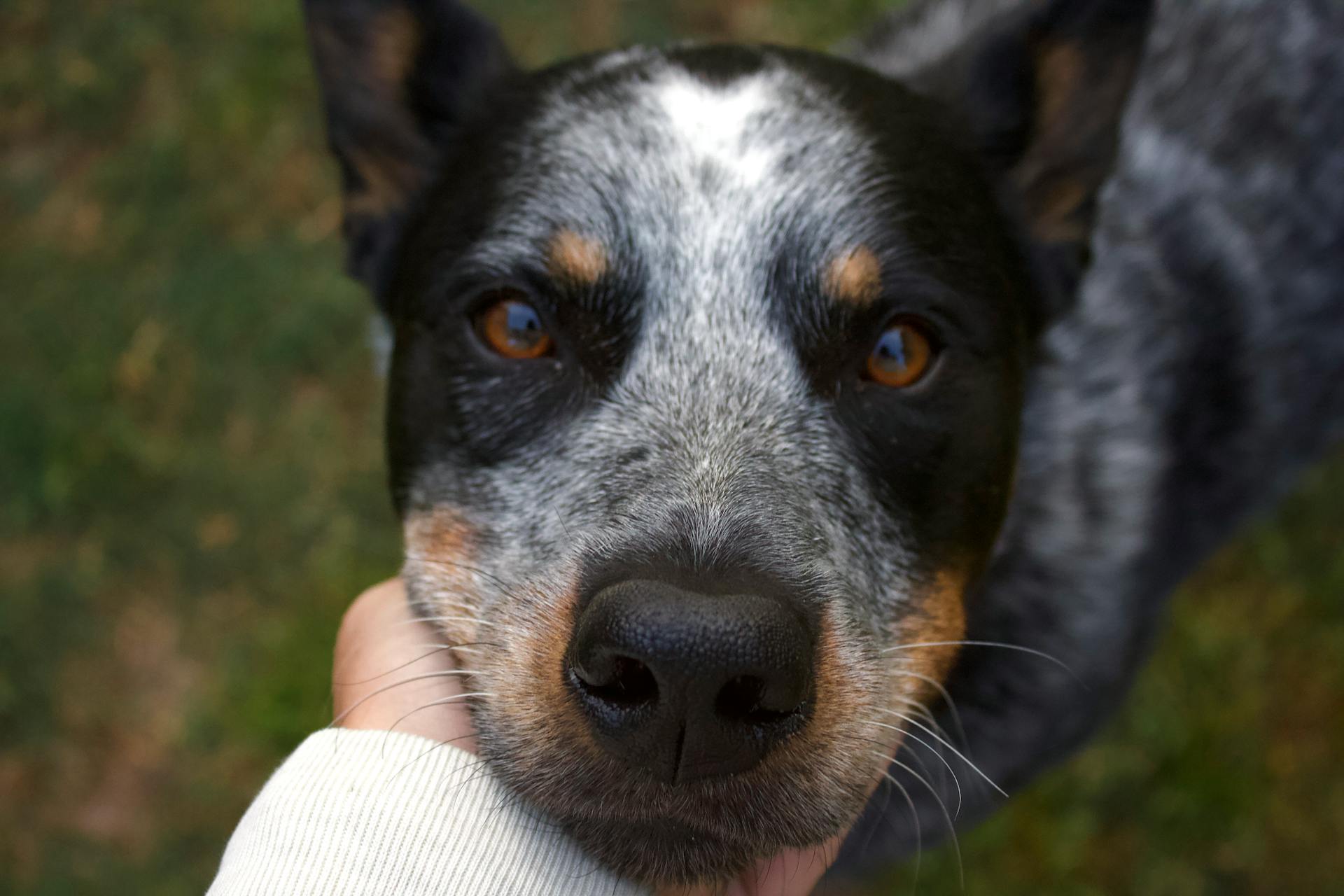
Blue Heelers are a popular breed, but like all dogs, they can be prone to certain health issues. Deafness is a common problem in Blue Heelers, with some studies suggesting that up to 20% of the breed may be affected.
As a result, owners should be aware of the signs of deafness in their dogs, such as a lack of response to loud noises or a failure to react to their name being called. Early detection is key to managing the condition.
Hip dysplasia is another issue that can affect Blue Heelers, causing arthritis and mobility problems. Regular exercise and a healthy weight are crucial in preventing or managing the condition.
Blue Heelers are also at risk of developing eye problems, such as cataracts and progressive retinal atrophy. Regular eye exams can help identify these issues early on.
If this caught your attention, see: Blue Heeler Intelligence
General Health and Care
Australian Cattle Dogs are generally robust and healthy, but like many breeds, they can be predisposed to certain genetic conditions.
Regular veterinary appointments are crucial to maintain their health, focusing on preventive measures to avoid common diseases and infections. Consistent, daily care is essential to keep your Blue Heeler in top shape.
A standard veterinary checkup typically costs around $50, but extra testing, bloodwork, treatment, and medications can quickly increase the costs to hundreds, or even thousands, of dollars.
By keeping up with routine care, you can protect your Heeler's long-term health and your savings.
Common health issues in the breed include sensorineural deafness, progressive retinal atrophy, and hip and elbow dysplasia. Most breed-specific disorders are genetic.
You can reduce the likelihood of several problems by investing in pet insurance and choosing a reputable breeder who does rigid testing.
Here are some common health issues to be aware of:
- Deafness
- Progressive retinal atrophy
- Hip dysplasia
- Elbow dysplasia
- Heart conditions
Health Issues and Problems
Blue Heelers are generally robust and healthy, but like many breeds, they can be predisposed to certain genetic conditions. Regular veterinary appointments and monitoring their health closely are essential to catch any potential issues early on.
Progressive retinal atrophy, also known as PRA, is a degenerative eye condition that can lead to night blindness or even full blindness. If you suspect that your pup has vision problems, check in with your vet for the best course of action.
Some other health issues associated with Blue Heelers include hip dysplasia, which can be managed with supplements and medications, and hearing loss due to genetic susceptibility to deafness. Fortunately, many hearing-challenged Blue Heelers can still have a high quality of life with small interventions.
Here are some common health issues in Blue Heelers:
- Progressive retinal atrophy
- Hip dysplasia
- Hearing loss (deafness)
Sociability
Australian Cattle Dogs can be reserved with strangers, making early socialization crucial.
This means they need to be introduced to new people, environments, and experiences at a young age to help them feel confident and calm in new situations.
Their loyalty and protective nature towards their families can sometimes make them wary of outsiders, so it's essential to expose them to various social situations to prevent any potential behavioral issues.
Health
Australian Cattle Dogs are generally robust and healthy, but like many breeds, they can be predisposed to certain genetic conditions.
Hip dysplasia and progressive retinal atrophy are common health issues in this breed. Regular veterinary appointments are crucial to monitor their health.
Some potential health issues associated with Blue Heelers include progressive retinal atrophy, hip dysplasia, and hearing loss. These conditions can be managed with proper care and treatment.
Here are some specific health issues to watch out for:
Deafness is a common issue in Australian Cattle Dogs, but many affected dogs can still have a good quality of life with small interventions. It's essential to monitor their health closely and consult a veterinarian if any unusual signs are observed.
Broaden your view: Red Blue Heeler Mix Dogs
Allergies
Allergies can be a real challenge for Blue Heelers. They're prone to developing allergies, just like humans, and it's often hard to pinpoint the exact cause.
Their immune system overreacts to certain stimuli, leading to skin itchiness, irritation, inflammation, and mild discomfort. This can manifest in various ways, including constant licking or biting at their skin, ear infections, or even hair loss.
Atopy is a common allergy in Blue Heelers, and it's often triggered by environmental allergens like pollen, dust mites, and mold. These allergens can cause intense itching and skin inflammation, making life miserable for your furry friend.
To manage allergies, you'll need to work closely with your vet to determine the underlying cause. They may recommend blood tests to identify the culprit, and then you can start making lifestyle changes to minimize exposure.
Here are some common allergens that can trigger atopy in Blue Heelers:
- Pollen
- Dust mites
- Mold
By understanding the potential causes of allergies in Blue Heelers, you can take steps to prevent or alleviate symptoms, keeping your furry friend happy and healthy.
Nutrition and Feeding
Blue Heelers, also known as Australian Cattle Dogs, require a balanced diet that fuels their high energy and agility. A diet rich in proteins and vitamins is crucial for maintaining muscle mass and overall well-being.
To meet these needs, feed your Blue Heeler premium quality kibble that is specifically formulated for active breeds. This ensures their diet is balanced and complete, providing all the necessary nutrients without extensive meal planning.
As adults, Blue Heelers will eat 1.5–2.5 cups of food daily, depending on their size and activity level, split between two meals. Consistent, daily care is crucial to maintain their health, focusing on preventive measures to avoid common diseases and infections.
Here are some whole meat protein sources to look for in your Blue Heeler's food:
- Wild caught fish
- Chicken
- Turkey
- Duck
- Beef
- Venison
These ingredients provide the necessary protein and fats for your Blue Heeler's development and maintenance, and can be beneficial for those who are especially active or looking to add variety to their diet.
Daily Requirements
Australian Cattle Dogs are high-energy dogs that require a balanced diet to maintain their muscle mass and overall well-being. A diet rich in proteins and vitamins is crucial for their active lifestyle.
For Australian Cattle Dogs, premium quality kibble that is specifically formulated for active breeds is recommended. Such kibble ensures that their diet is balanced and complete, providing all the necessary nutrients without the need for extensive meal planning.
Curious to learn more? Check out: Cow Dog Mix
To fuel their active lifestyle, Australian Cattle Dogs need high-quality proteins and fats as the main ingredients in their food. As adults, they'll eat 1.5–2.5 cups of food daily, depending on their size and activity level, split between two meals.
Whole meat protein sources are the best option for your Australian Cattle Dog's diet. Look for food that lists whole meat protein sources as the first ingredient, such as wild caught fish, chicken, turkey, duck, beef, or venison.
Here are some examples of whole meat protein sources to look for in your dog's food:
- Wild caught fish
- Chicken
- Turkey
- Duck
- Beef
- Venison
By choosing the right food for your Australian Cattle Dog, you can help them thrive and maintain their active lifestyle.
The Honest Kitchen's Top Picks
The Honest Kitchen's Top Picks are based on their commitment to providing healthy, natural, and sustainable pet food options. They offer a range of formulas tailored to different life stages and dietary needs.
Their Beams grain-free dog food is a top pick for its high protein content and limited ingredient list. It's made with real meat as the first ingredient and contains no artificial preservatives or flavors.
Their Zeal cat food is another top pick for its unique blend of fruits, vegetables, and whole grains. It's designed to support feline digestive health and immunity.
The Honest Kitchen's limited ingredient diets, like their Verve formula, are great for pets with food sensitivities or allergies. These formulas feature a single protein source and minimal ingredients to reduce the risk of adverse reactions.
Their dehydrated foods, such as their Embark recipe, are a convenient and healthy option for pets on-the-go. These foods are made with whole ingredients and contain no fillers or by-products.
Additional reading: Best Food for Blue Heeler
Health Considerations and Precautions
Blue Heelers are generally robust and healthy dogs, but like any breed, they can be predisposed to certain genetic conditions. Hip dysplasia and progressive retinal atrophy are two common issues that can affect them.
If you're considering bringing a Blue Heeler into your family, it's essential to be aware of these potential health concerns. With a reputable breeder who does rigid testing, you can reduce the likelihood of several problems.
Deafness, progressive retinal atrophy, hip dysplasia, elbow dysplasia, and heart conditions are all potential health issues that can affect Blue Heelers. Here's a breakdown of these conditions:
- Deafness
- Progressive retinal atrophy
- Hip dysplasia
- Elbow dysplasia
- Heart conditions
Choosing a Breeder
Choosing a breeder is a crucial step in bringing home a healthy Australian Cattle Dog. A reputable breeder can make all the difference in the health and well-being of your new pet.
Selecting a reputable breeder directly influences the health and well-being of the puppy. This is because a responsible breeder will provide transparency regarding the health status of the puppy, including any known illnesses in its lineage.
A responsible breeder will provide you with information about the health of the puppy and its parents. This includes any known illnesses in its lineage, which is essential for preparing for the future health care of your new pet.
A unique perspective: Australian Blue Heeler Puppy
Preventative Medications
Preventative Medications can be a significant expense, especially for larger breeds like the Blue Heeler. Together, flea, tick, and heartworm preventatives can cost around $100–$300 per year, depending on your pup's weight.
Protecting your dog from parasites and pests is crucial, so it's essential to consider the cost of preventative medications as part of your annual budget.
For your interest: How Much Does a Blue Heeler Puppy Cost
Do They Shed?
Blue Heelers have a thick double coat that they shed heavily, especially during spring and fall. This can be a problem for people with sensitive allergies.
You can minimize the fur and dander floating through the air with regular bathing and brushing. This will help reduce the amount of shedding, but it won't eliminate it entirely.
Expect the occasional flurry of fur coming off your pooch, even with regular grooming. It's just part of owning a Blue Heeler!
Australian Cattle Dog Specifics
Australian Cattle Dogs are generally robust and healthy, but like many breeds, they can be predisposed to certain genetic conditions.
Common health issues in the breed include sensorineural deafness, progressive retinal atrophy, and hip and elbow dysplasia. Most breed-specific disorders are genetic.
Investing in pet insurance ensures that you can provide the best care for your dog as they grow. This is especially important for Australian Cattle Dogs, as they can be prone to certain health issues.
Here are some specific health concerns to be aware of:
- Deafness
- Progressive retinal atrophy
- Hip dysplasia
- Elbow dysplasia
- Heart conditions
Sources
- https://www.weenect.com/us/en/guide/dog-breeds/australian-cattle-dog/
- https://post.bark.co/breeds/australian-cattle-dog-blue-heeler-guide/
- https://www.dogster.com/dog-breeds/australian-cattle-dog-blue-heeler
- https://www.petinsurancereview.com/blog/australian-cattle-dog-health-issues
- https://www.thehonestkitchen.com/blogs/pet-food-ingredients/best-dog-food-for-blue-heeler
Featured Images: pexels.com


